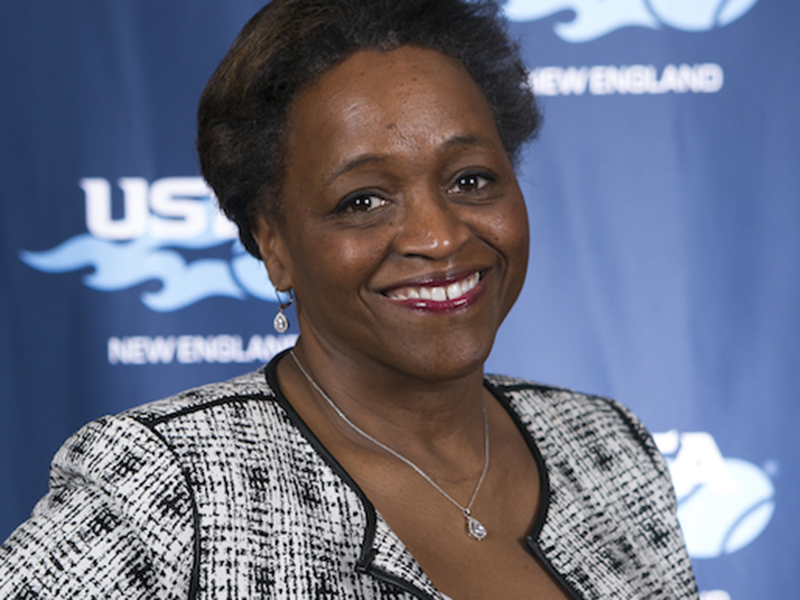Toni Wiley, the CEO of the award-winning Sportsmen’s Tennis & Enrichment Center, has a keen grasp of the role and influence her USTA Foundation NJTL chapter continues to play in the life of the youngsters who walk through the doors at the Dorchester, Mass., facility.
And, having grown up just down the street from the center, she is acutely aware of the role Sportsmen’s plays in the community.
But she hesitates when asked what she would like her legacy to be. Wiley joined Sportsmen’s in 2008, at a time when the center—which was founded in 1961 and became the first indoor non-profit tennis club built by and for the African-American community—was in danger of closing its doors.
“When I came on board, the organization was struggling financially,” she said. “I would like my legacy to be that the organization never goes back to that period, when there was a risk of closing the doors. I’d like there to always be an understanding of what we have to do to keep the lights on and to be responsive to community needs. You can only do that with some degree of financial flexibility, and I’m hopeful for the work we’ve done to build the board and the financial management staff and our fundraising capacity. I hope that’s the legacy I leave behind.”
Under Wiley’s leadership, Sportsmen’s has been lauded over the last dozen years for all it brings to youngsters and to its underserved neighborhoods, and Wiley herself received one of the USTA’s highest honors in 2019, the Eve F. Kraft Community Service Award. Sportsmen’s offers free and low-cost tennis, academics and life skills programming to more than 5,000 youngsters annually, with many pioneering programs and partnerships on and off its indoor and outdoor courts.
Before joining Sportsmen’s, Wiley—who is a member of the USTA New England Board of Directors, a member of the USTA’s National Diversity & Inclusion Committee, and an American Tennis Association (ATA) board member—worked in the corporate world. She then joined Jane Doe Inc.–the Massachusetts Coalition Against Sexual Assault and Domestic Violence, then helped to launch programs with the United Way focusing on financial literacy for women. Through those experiences, “I came to understand some of the challenges in running a nonprofit,” she said.
“Since I’ve transitioned into the nonprofit sector, what I’ve realized is the closer I get to the beneficiaries of the work, the more I can put my whole heart into the work,” she said. “At Sportsmen’s, not only do I get to meet and know these kids and families—you see them grow up and graduate, then go off to college, and in some cases graduate from college—but I can see how the neighborhood has changed over the years. It’s very meaningful to be able to say I’ve seen issues around housing and food insecurity, or the graduation rate, then being able to initiate programs that address these issues. That’s just been tremendous.”
Within weeks after joining Sportsmen’s in June 2008, Wiley noticed a Boston police officer, Frank Williams Jr., playing tennis with kids after his shift. She told Williams to bring the kids over to Sportsmen’s to play, then suggested adding in other programs to help round out the youngsters’ visits. The next summer, she, Williams and the Sportsmen’s staff started the Volley Against Violence program.
“We went to the police brass and asked to replicate the program in other precincts,” Wiley said. “Working together, Frank and I were really able to accomplish something meaningful to the community and the police. We’ve brought in hundreds of thousands of dollars over the years for this program.” Volley Against Violence has helped maintain positive relationships between police and the community, and it has served as the model for the USTA’s Serve & Connect program.
Five years ago, Sportsmen’s launched the Center for Community Wellness (CCW), to advance patient health and chronic disease prevention in Dorchester and nearby underserved neighborhoods. The CCW is designed to bring innovative community-based health, fitness and nutrition programs directly to patients. The CCW also links with Brigham and Women’s Center for Community Wellness Health Discussions, incorporating formal gym and exercise classes with wide-ranging curriculum of health promotion and weight reduction activities for all ages.
“Prior to COVID-19, we had free forums once a month,” Wiley said. “Now we’ve pivoted to an online format, continuing to do workshops on everything from diabetes, to kidney health, colon cancer, understanding coronavirus—anything prevalent in the community. We did one on the COVID vaccine trials—the need for the trial population to reflect the general population—and more recently, questions and answers about the vaccine.”
Sportsmen’s has also utilized its parking lot for COVID testing and for food distribution.
“I came into this job with no background in tennis,” Wiley said. “Developing a relationship with the USTA has been tremendously important to me. It all has helped me to understand the potential for tennis to be life-changing for kids.”
Peter Francesconi | February 16, 2021
Original article

